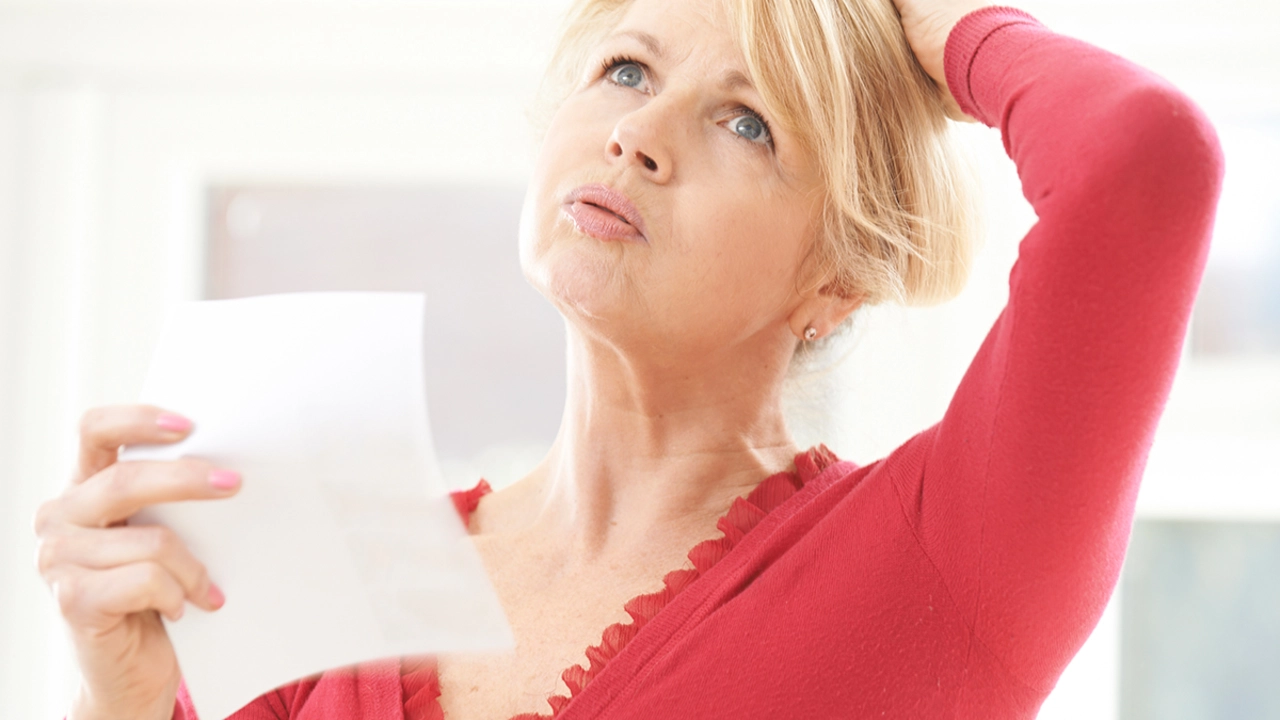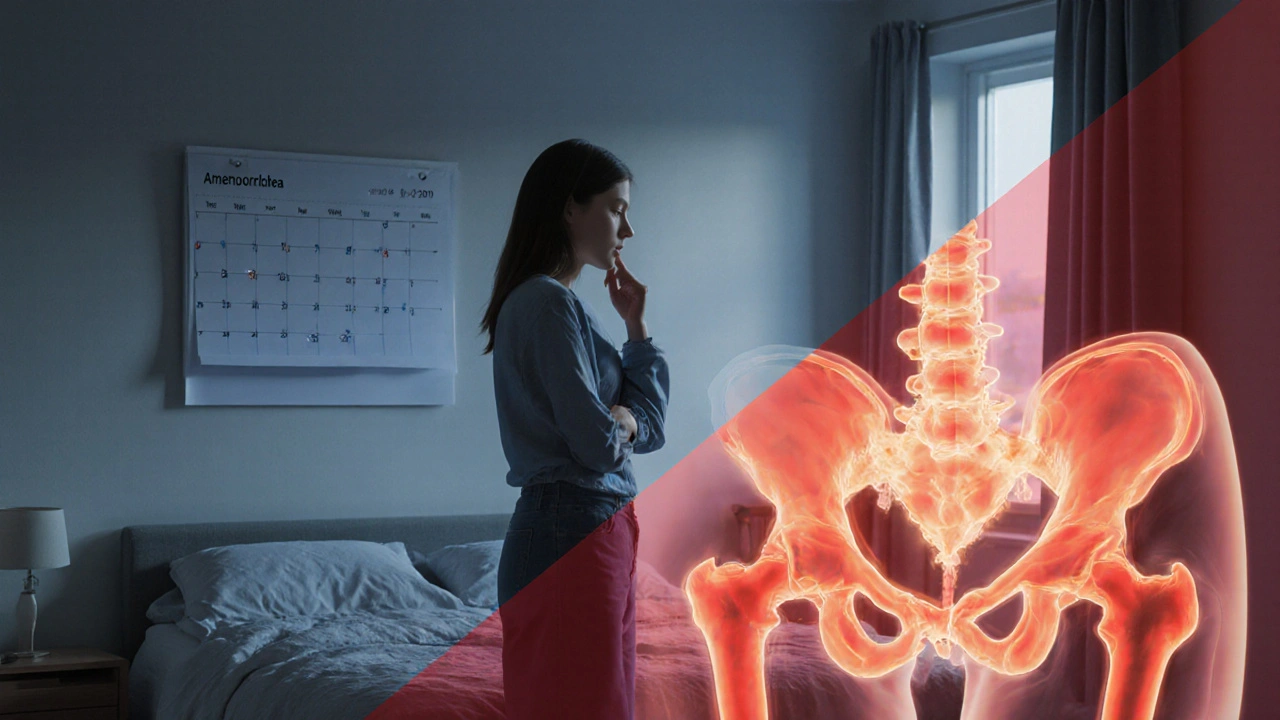Understanding Amenorrhea
Before delving into the connection between amenorrhea and menopause, it’s important to understand what amenorrhea is. Amenorrhea is a medical condition characterized by the absence of menstrual periods in a woman of reproductive age. It can be primary, occurring when a woman has never had a period by the age of 16, or secondary, when menstruation stops for three months or more in women who have previously had regular periods.
Many factors can contribute to amenorrhea, including stress, extreme weight loss, hormonal imbalances, and certain medications. It's also worth noting that while amenorrhea is not a disease in itself, it can be a symptom of a more serious underlying health issue such as polycystic ovary syndrome (PCOS) or a pituitary tumor.
Overview of Menopause
Menopause, on the other hand, is a natural biological process that marks the end of a woman's reproductive years. It typically occurs between the ages of 45 and 55, when the ovaries no longer release an egg every month and menstruation stops. This period in a woman's life is characterized by various symptoms such as hot flashes, night sweats, mood changes, and vaginal dryness.
Menopause is considered a normal part of aging. However, it can also be induced prematurely by certain medical treatments such as chemotherapy or surgery to remove the ovaries. Like amenorrhea, menopause can lead to serious health issues if not managed properly, including osteoporosis and heart disease.
The Connection between Amenorrhea and Menopause
The main connection between amenorrhea and menopause lies in the cessation of menstrual periods. In both cases, menstruation stops, but for different reasons. With amenorrhea, it's usually a symptom of an underlying health issue or a response to certain lifestyle factors. With menopause, it's a natural part of the aging process.
It's also worth noting that amenorrhea can be a sign of early or premature menopause in some women. If you're experiencing amenorrhea and you're under 40, it's important to seek medical advice as this could indicate early menopause, which can have significant health implications.
Diagnosis and Treatment of Amenorrhea
If you are experiencing amenorrhea, it's important to see your doctor. The diagnosis usually involves a physical examination, a review of your medical history, and possibly some tests to rule out underlying health issues. Treatment for amenorrhea focuses on addressing the underlying cause. This may involve lifestyle changes, medication, or in some cases, surgery.
It's important to remember that while amenorrhea may not seem like a serious issue, it can have significant implications for your health and fertility. Therefore, getting a timely diagnosis and appropriate treatment is crucial.
Managing Menopause Symptoms
Menopause is a natural process, but that doesn't mean you have to suffer in silence. There are many ways to manage the symptoms of menopause and improve your quality of life during this time. This may include hormone replacement therapy (HRT), natural remedies, lifestyle changes, and regular check-ups with your doctor.
It's important to remember that every woman experiences menopause differently. What works for one woman may not work for another. Therefore, it's crucial to have open and honest conversations with your healthcare provider about your symptoms and treatment options.
Conclusion: A Holistic Approach to Women's Health
In conclusion, while amenorrhea and menopause are two different conditions, they both highlight the need for a holistic approach to women's health. It's important for women to listen to their bodies, seek medical advice when needed, and take proactive steps to manage their health and wellbeing throughout their lives.
Whether you're dealing with amenorrhea or navigating the challenges of menopause, remember that you're not alone. There are resources and support systems available to help you through these experiences. And most importantly, remember that there's no 'right' way to go through these life stages – everyone's journey is unique.








Mustapha Mustapha
July 21, 2023 AT 20:59It's interesting how amenorrhea can signal broader health concerns, not just a missed period. I’ve seen many cases where stress and nutrition play a huge role. Keeping an eye on overall wellbeing is key. If you notice changes, a check‑up can catch underlying issues early.
Ben Muncie
July 24, 2023 AT 10:19Most people treat menopause like a casual rite of passage, but it’s a serious hormonal shift that deserves proper medical attention. Skipping professional advice is reckless.
kevin tarp
July 26, 2023 AT 23:39Just a quick note: the term "amenorrhea" should always be written with a lower‑case "a" unless it begins a sentence. Also, "menopause" is a noun, not an adjective, so avoid phrases like "menopause symptoms" when you mean "menopausal symptoms".
ravi kumar
July 29, 2023 AT 12:59From a national health perspective, early menopause can strain our medical infrastructure, especially in developing regions. We need more public awareness campaigns that target young women working long hours under stress. Lifestyle factors like extreme dieting are not just personal choices; they reflect societal pressures. If we ignore the link between amenorrhea and premature menopause, we’ll continue to see rising cases of osteoporosis and cardiovascular disease. Governments should fund research into culturally appropriate interventions. Education in schools about hormonal health could prevent many cases. Moreover, workplace policies that reduce chronic stress can make a real difference. It’s high time we treat women’s health as a national priority.
SandraAnn Clark
August 1, 2023 AT 02:19Seems like another over‑hyped health article.
Keisha Moss Buynitzky
August 3, 2023 AT 15:39Dear reader, I empathize deeply with the anxieties surrounding both amenorrhea and menopause. It is advisable to consult a qualified healthcare professional to tailor a management plan that respects your personal circumstances. Please consider keeping a symptom journal to facilitate meaningful discussions with your provider.
Shivam yadav
August 6, 2023 AT 04:59Our cultural traditions often celebrate women's life stages, yet modern stressors can disrupt them. A balanced diet and gentle yoga can help maintain hormonal harmony without aggressive interventions. Sharing experiences within the community fosters support and resilience.
pallabi banerjee
August 8, 2023 AT 18:19Thinking about amenorrhea, we might reflect on how the body signals imbalance. Early menopause is a reminder that the body’s timeline can shift, urging us to listen. Simple lifestyle tweaks, like regular walks and balanced meals, often make a difference.
Alex EL Shaar
August 11, 2023 AT 07:39Alright, buckle up because this post is a roller‑coaster of vague generalities and recycled boilerplate. First off, “amenorrhea can be a sign of early menopause” – duh, that’s literally the definition of the term, no need for a fancy paragraph. Then we wade through a sea of bland buzzwords like “holistic approach” and “proactive steps” that sound like corporate wellness fluff. The author never actually explains *how* lifestyle changes affect estrogen levels, just throws in “exercise, diet, sleep” as if they’re magical panaceas. And where are the references? A couple of dead‑link studies, which makes the whole thing feel like a click‑bait SEO stunt. The section on hormone replacement therapy is half‑hearted, warning about risks without giving any practical guidance or alternative options. Did someone forget to add their actual expertise? The tone is overly soothing, like a self‑help book you’d read in a waiting room, but the content is as thin as a paper towel. If you want real insight, you’d need to dive into endocrinology textbooks, not this superficial checklist. In short, the article is a missed opportunity wrapped in corporate‑speak, offering comfort without substance. It’s about as helpful as a motivational poster that says “Believe in yourself” next to a broken printer. Bottom line: skip the fluff, consult a qualified professional, and demand evidence‑based information if you care about your health.
Anna Frerker
August 13, 2023 AT 20:59This article is kinda boring, lol. Early menopause is serious, no joke.
Julius Smith
August 16, 2023 AT 10:19Wow, such an informative read! 👍👍👍
Brittaney Phelps
August 18, 2023 AT 23:39Great points about staying active and seeking medical advice – keep it up!
Kim Nguyệt Lệ
August 21, 2023 AT 12:59There are several grammatical errors in the original article that need correction: "menopause" should not be capitalized mid‑sentence, and "amenorrhea" is misspelled in the third paragraph.
Rhonda Adams
August 24, 2023 AT 02:19I'm really glad you shared this – it's so important to feel supported! 😊
Macy-Lynn Lytsman Piernbaum
August 26, 2023 AT 15:39When we think about cycles, we’re really pondering the rhythm of life itself. 🌿✨ It’s wild how a missed period can prompt a deep philosophical dive into our bodies' narratives. Remember, every symptom is a story waiting to be heard. 💭
Alexandre Baril
August 29, 2023 AT 04:59For anyone dealing with these issues, consider scheduling a comprehensive hormonal panel. Simple blood work can reveal a lot and guide treatment options.
Stephen Davis
August 31, 2023 AT 18:19Wow, the interplay between stress, diet, and hormones is like a wild dance! 🌟 If we can sync our lifestyles to this rhythm, we might just dodge early menopause altogether. Let’s keep the conversation flowing and share our own tips.
Grant Wesgate
September 3, 2023 AT 07:39Really helpful summary – thanks for the clear guidance! 😊
Richard Phelan
September 5, 2023 AT 20:59Oh, another article trying to sound scientific while barely scratching the surface! The drama of “holistic approach” is just a marketing ploy. If you’re looking for real answers, stop reading fluff and talk to a specialist.